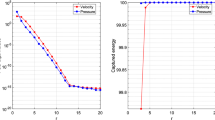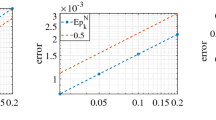Abstract
This paper is concerned with numerical analysis of two fully discrete Chorin-type projection methods for the stochastic Stokes equations with general non-solenoidal multiplicative noise. The first scheme is the standard Chorin scheme and the second one is a modified Chorin scheme which is designed by employing the Helmholtz decomposition on the noise function at each time step to produce a projected divergence-free noise and a “pseudo pressure" after combining the original pressure and the curl-free part of the decomposition. An \(O(k^\frac{1}{4})\) rate of convergence is proved for the standard Chorin scheme, which is sharp but not optimal due to the use of non-solenoidal noise, where k denotes the time mesh size. On the other hand, an optimal convergence rate \(O(k^\frac{1}{2})\) is established for the modified Chorin scheme. The fully discrete finite element methods are formulated by discretizing both semi-discrete Chorin schemes in space by the standard finite element method. Suboptimal order error estimates are derived for both fully discrete methods. It is proved that all spatial error constants contain a growth factor \(k^{-\frac{1}{2}}\), where k denotes the time step size, which explains the deteriorating performance of the standard Chorin scheme when \(k\rightarrow 0\) and the space mesh size is fixed as observed earlier in the numerical tests of Carelli et al. (SIAM J Numer Anal 50(6):2917–2939, 2012). Numerical results are also provided to guage the performance of the proposed numerical methods and to validate the sharpness of the theoretical error estimates.






Similar content being viewed by others
Data Availability Statement
All datasets generated during the current study are available from the corresponding author upon reasonable request.
References
Bensoussan, A.: Stochastic Navier–Stokes equations. Acta Appl. Math. 38, 267–304 (1995)
Bensoussan, A., Temam, R.: Equations stochastiques du type Navier–Stokes. J. Funct. Anal. 13, 195–222 (1973)
Bessaih, H., Brzeźniak, Z., Millet, A.: Splitting up method for the 2D stochastic Navier–Stokes equations. Stoch. PDE Anal. Comp. 2, 433–470 (2014)
Bessaih, H., Millet, A.: On strong \(L^2\) convergence of time numerical schemes for the stochastic 2D Navier-Stokes equations. arXiv:1801.03548 [math.PR], to appear in IMA J. Numer. Anal
Breit, D., Dodgson, A.: Convergence rates for the numerical approximation of the 2D stochastic Navier-Stokes equations. arXiv:1906.11778v2 [math.NA] (2020)
Brenner, S.C., Scott, L.R.: The Mathematical Theory of Finite Element Methods, 3rd edn. Springer, New York (2008)
Brzeźniak, Z., Carelli, E., Prohl, A.: Finite element based discretizations of the incompressible Navier–Stokes equations with multiplicative random forcing. IMA J. Numer. Anal. 33, 771–824 (2013)
Carelli, E., Hausenblas, E., Prohl, A.: Time-splitting methods to solve the stochastic incompressible Stokes equations. SIAM J. Numer. Anal. 50(6), 2917–2939 (2012)
Carelli, E., Prohl, A.: Rates of convergence for discretizations of the stochastic incompressible Navier–Stokes equations. SIAM J. Numer. Anal. 50(5), 2467–2496 (2012)
Chow,P.-L.: Stochastic Partial Differential Equations, Chapman and Hall/CRC, (2007)
Da Prato, G., Zabczyk, J.: Stochastic Equations in Infinite Dimensions. Cambridge University Press, Cambridge (1992)
Feng, X., Qiu, H.: Analysis of fully discrete mixed finite element methods for time-dependent stochastic Stokes equations with multiplicative noise. J. Sci. Comput. 88, 31 (2021). https://doi.org/10.1007/s10915-021-01546-4
Feng, X., Prohl, A., Vo, L.: Optimally convergent mixed finite element methods for the stochastic stokes equations. IMA J. Numer. Anal. 41(3), 2280–2310 (2021)
Feng, X., Vo, L.: Analysis of Chorin-type projection methods for the stochastic Stokes equations with general multiplicative noises. arXiv:2010.15297 [math.NA] (2020)
Girault, V., Raviart, P.-A.: Finite Element Methods for Navier–Stokes Equations. Springer, New York (1986)
Guermond, J.L., Minev, P., Shen, J.: An overview of projection methods for incompressible flows. Comput. Methods Appl. Mech. Engrg. 195, 6011–6045 (2006)
Hughes, T.J.R., Franca, L.P., Balestra, M.: A new finite element formulation for computational fluid mechanics: V. Circumventing the Babuska-Brezzi condition: A stable Petrov-Galerkin formulation of the Stokes problem accomodating equal order interpolation. Comput. Meth Appl. Mech. Eng. 59, 85–99 (1986)
Hairer, M., Mattingly, J.C.: Ergodicity of the 2D Navier–Stokes equations with degenerate stochastic forcing. Ann. Math. 164, 993–1032 (2006)
Langa, J.A., Real, J., Simon, J.: Existence and regularity of the pressure for the stochastic Navier–Stokes equations. Appl. Math. Optim. 48, 195–210 (2003)
Prohl, A.: Projection and Quasi-Compressibility Methods for Solving the Incompressible Navier-Stokes Equations, Advances in Numerical Mathematics. B.G. Teubner, Stuttgart (1997)
Rannacher, R.: On Chorin’s projection method for the incompressible Navier-Stokes Equations. The Navier-Stokes Equations II - Theory and Numerical Methods. Lecture Notes in Mathematics, vol 1530, Springer, Berlin, Heidelberg, (1992)
Temam, R.: Navier-Stokes Equations. Theory and Numerical Analysis, 2nd ed., AMS Chelsea Publishing, Providence, RI, (2001)
Acknowledgements
The authors are grateful to an anonymous referee for spotting an error in the proof of Theorem 3.1 of the first submitted version, that led to a substantial revision of the proofs of Theorem 3.1 and several subsequent theorems of the paper, and most importantly it improved and strengthened the results of Theorem 3.1 and subsequently related theorems.
Author information
Authors and Affiliations
Contributions
The authors contributed equally to this work.
Corresponding author
Ethics declarations
Conflict of interest
The authors declare that they have no conflict of interest.
Code availability
Available upon reasonable request.
Additional information
Publisher's Note
Springer Nature remains neutral with regard to jurisdictional claims in published maps and institutional affiliations.
This work was partially supported by the NSF grants DMS-1620168 and DMS-2012414.
Rights and permissions
About this article
Cite this article
Feng, X., Vo, L. Analysis of Chorin-type projection methods for the stochastic Stokes equations with general multiplicative noise. Stoch PDE: Anal Comp 11, 269–306 (2023). https://doi.org/10.1007/s40072-021-00228-4
Received:
Revised:
Accepted:
Published:
Issue Date:
DOI: https://doi.org/10.1007/s40072-021-00228-4
Keywords
- Stochastic Stokes equations
- Multiplicative noise
- Wiener process
- Itô stochastic integral
- Chorin projection scheme
- Inf-sup condition
- Error estimates.




